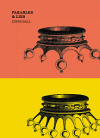Parables & Lies
Kafkaesque is a term that is passed off superfluously in today’s impalpable literary landscape. However, if there is one author that would be a suitable to such an intricate title, poet and author Jesse Ball would be a likely candidate. This is by no means meant as a reduction. The author of a prize winning collection of poetry (March Book) and a stirring novel (Samedi the Deafness), Ball’s prolific output, as well as his command over his singular voice, often lead him astray from Kafka’s parochial table. Yet one has little doubt his newest collection, Parables and Lies, is indebted, if not a conscious tribute, to the short works of the Czechian master.
Kafkaesque is a term that is passed off superfluously in today’s impalpable literary landscape. However, if there is one author that would be a suitable to such an intricate title, poet and author Jesse Ball would be a likely candidate. This is by no means meant as a reduction. The author of a prize winning collection of poetry (March Book) and a stirring novel (Samedi the Deafness), Ball’s prolific output, as well as his command over his singular voice, often lead him astray from Kafka’s parochial table. Yet one has little doubt his newest collection, Parables and Lies, is indebted, if not a conscious tribute, to the short works of the Czechian master.
Assumedly fashioned as a likeness to Kafka’s Parables and Paradoxes, these 37 concise tales function less as allegories embedded with folkloric wisdom, and more as magnificent prose poems that bare the bellicose teeth of a wolf in sheep’s clothing. Observe “The Palace” shown here in its entirety.
A palace so large that the kingdom itself is but a small part of it. Servants sent to some far corridor are given burials, for we know well that they will not return. Communication is a matter of whispers, which travel like cursed fact. And our hearts are maintained through windows, where courtesans’ soft skin and long lashes are augments that uphold his life. Everyone has their orders, which must be carried out. These are kept in tiny cylinders hung like pendants from our servile necks. Since we cannot read we must ask others to read these instructions for us. And often these interpretations change. All in all, it is a good way to be, or so I have heard, as beyond the walls of this enthronement there are great doubts like standing trees, and each outlives a man, and each is named for some task we will never be allowed.
Ball’s fixations with secrecy, duplicity, and all things rogue are propped up as the pillars of his world. Related in a voice that is at times classical in its formality and integrity, he builds his picaresque castles on the broken backs of characters living in some sort of bleak, feudal existence. Yet it is these attributes, and the ease and ability in which they enchant and capture the reader, that make them so appealing. “The Palace” serves as an appropriate analogy of the stories found in Parables & Lies; the accommodations are spatial and grand in form, but its inhabitants are condemned to small rooms, fearful of some watchful informer. Ball’s harnessing of a profound sense of dread brings the reader in closer, as if attending to a deadly secret. These secrets may mandate the reader’s awe, but lessons these are not.





